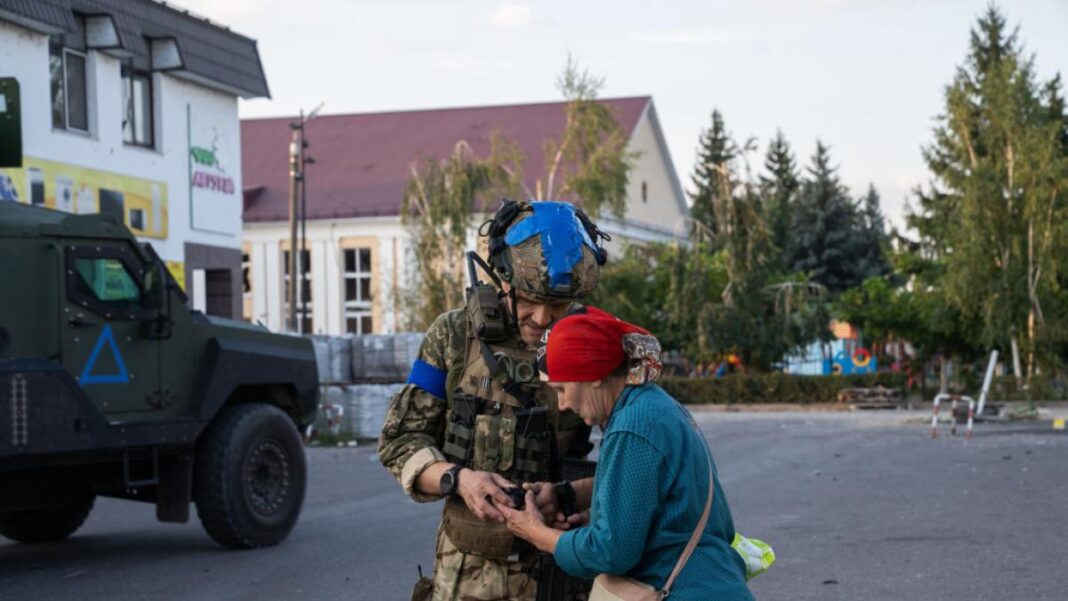BTN News: In an unprecedented and alarming turn of events, a former Russian lawmaker has publicly called for a massive bombing campaign on the region of Kursk, a territory within her own country. This shocking statement comes amid the ongoing Ukrainian incursion that has, over the past two weeks, resulted in significant territorial gains for Kyiv. Ukrainian forces have reportedly taken control of around 93 localities and over 1,200 square kilometers of Russian territory, leading to the evacuation of more than 122,000 residents from the affected areas.
The controversial remarks were made by Natalya Narotchnitskaya, an ex-member of the State Duma, during a broadcast on Russia’s state-run Channel One. The comments have since gained widespread attention after being shared by the Russian news outlet Astra, as reported by Newsweek. Narotchnitskaya’s call for retaliatory action underscores the escalating tension and desperation within some factions of the Russian political landscape as they grapple with the surprising advances of Ukrainian forces into Russian territory.
During the broadcast, Narotchnitskaya stated, “I believe that after everything that has happened in the Kursk region, such a retaliation is necessary. The Ukrainian forces must be surrounded and everything should be destroyed. Only a massive bombing campaign will suffice, do you understand? I hope preparations are being made for this.” Her words reflect a growing frustration and an apparent shift in rhetoric towards more extreme measures in response to Ukraine’s bold military actions.
Adding further fuel to the fire, her comments follow a similarly provocative suggestion from Kremlin propagandist Sergey Mardan, who had earlier floated the idea of a nuclear strike on Kursk. Speaking on the state television program Solovyov Live, Mardan suggested that while the world might initially be shocked by such an action, it would ultimately be seen as a “logical decision” given the circumstances. Mardan’s remarks represent an alarming escalation in the discourse surrounding Russia’s military strategy and hint at the potential for even more drastic measures as the situation continues to unfold.
Mardan speculated on the global reaction to a nuclear strike, saying, “In light of all the discussions over the past two years about the impossibility of a nuclear attack by Russia, the potential consequences, and what the response from the West and particularly the Global South might be… Well, in this situation, I am personally absolutely convinced that the reaction will be… Well, everyone will be a little upset, of course. But in general, they will say: ‘Okay. It’s logical.'”
These developments come at a critical juncture in the ongoing conflict between Russia and Ukraine, with the latter achieving unexpected success in pushing back Russian forces. The situation in Kursk, a region that has now found itself at the center of this conflict, is emblematic of the broader challenges facing Russia as it confronts a determined and increasingly effective Ukrainian military. The rhetoric from figures like Narotchnitskaya and Mardan reveals a growing sense of urgency and a willingness to consider extreme measures, including the use of nuclear weapons, to reclaim lost territory and reassert control.
As the world watches these events unfold, the potential for further escalation looms large. The international community has been closely monitoring the situation, with many fearing that such provocative statements could lead to catastrophic consequences. The idea of a nuclear strike, in particular, has raised alarms, given the devastating impact such an action would have not only on the region but on global stability.
In the coming days and weeks, the actions of the Russian government will be scrutinized as they navigate this increasingly volatile situation. Whether the rhetoric from figures like Narotchnitskaya and Mardan will translate into actual military decisions remains to be seen, but the very fact that such discussions are taking place on state-run media channels is indicative of the high stakes and the intense pressure within Russia to respond decisively to the Ukrainian advance.
As the conflict between Russia and Ukraine continues to evolve, the region of Kursk has become a focal point, with its fate potentially signaling broader shifts in the ongoing war. The international community will be watching closely, hoping for a resolution that avoids further bloodshed and devastation. However, with the current trajectory of events, the risk of a significant escalation remains a very real and troubling possibility.


